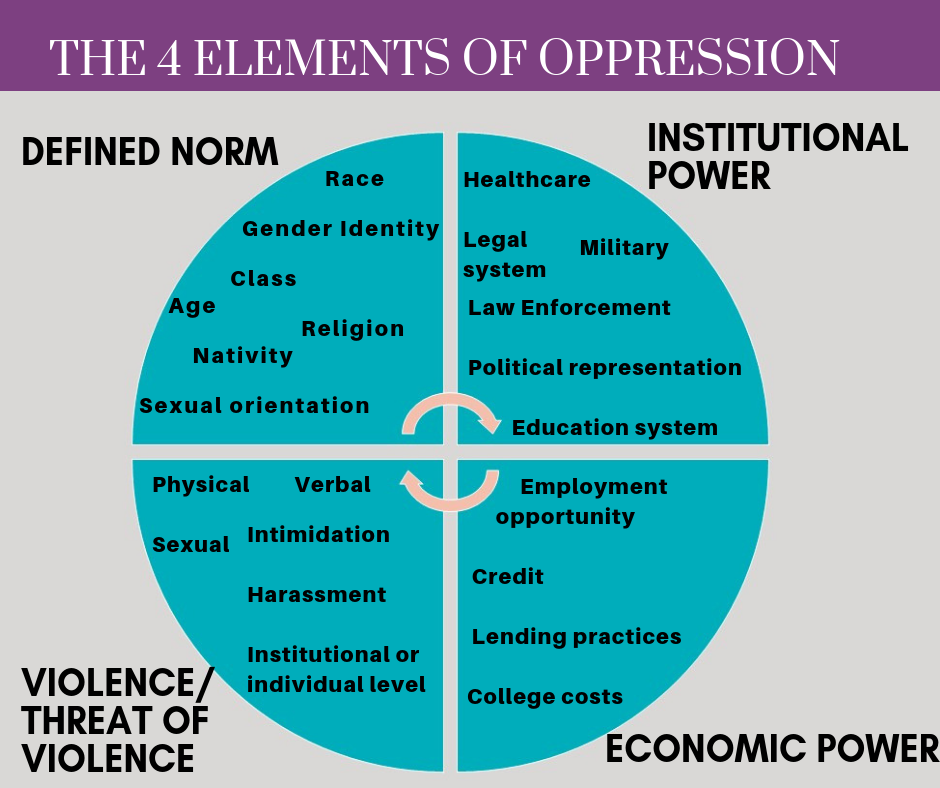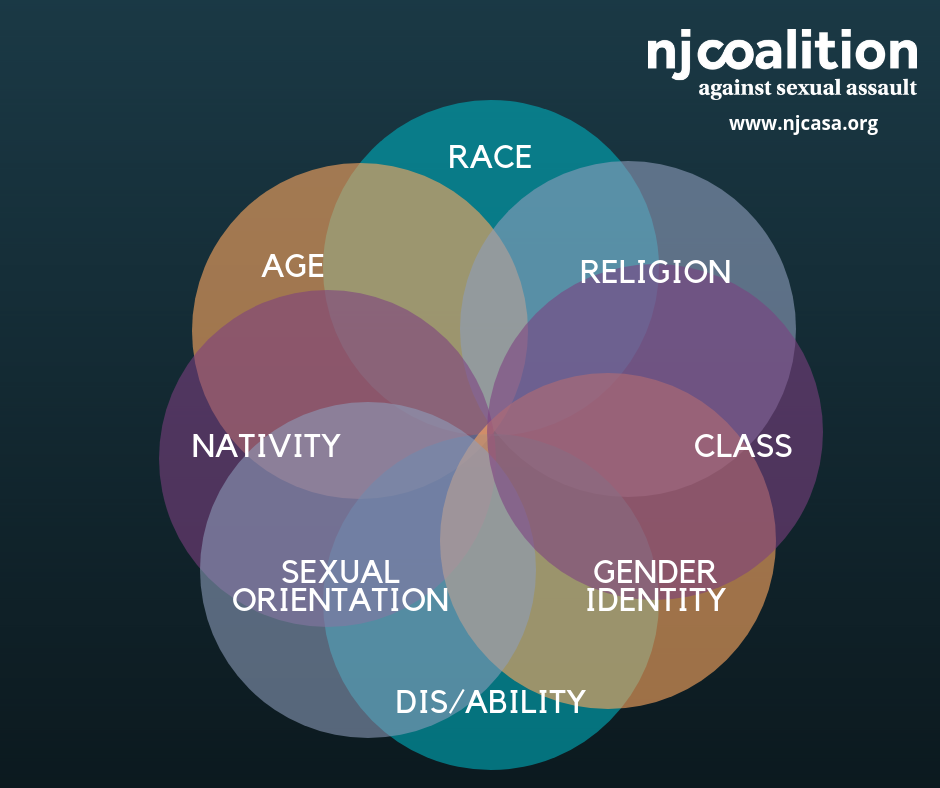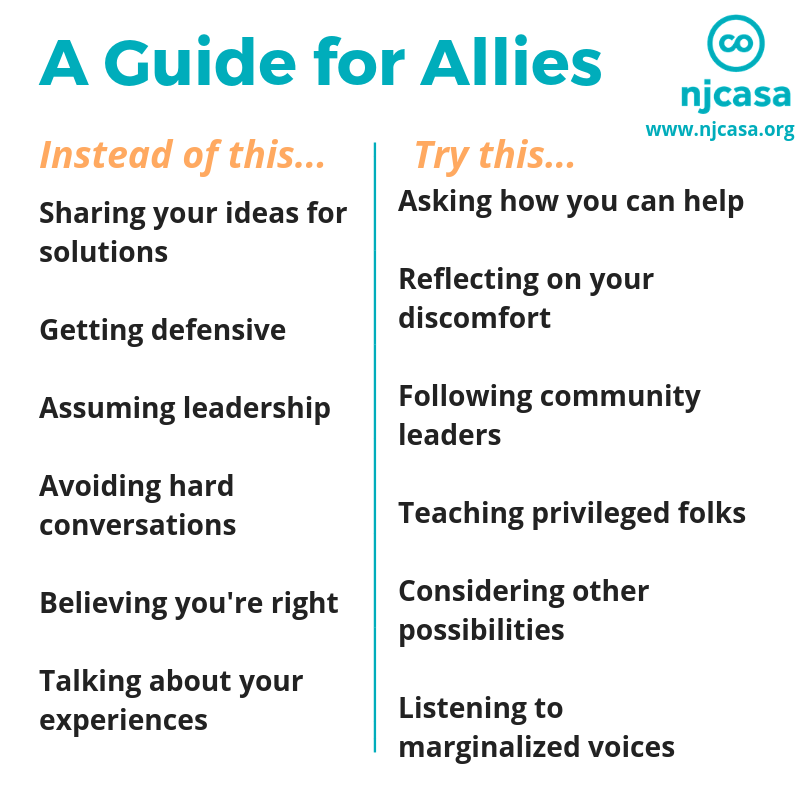What Is At the Intersections?
In At the Intersections, NJCASA explores the root cause of sexual violence: oppression. Through blog posts, infographics, and social media content, we seek to break down how racism, sexism, homophobia, transphobia, white nationalism, and other -isms all contribute to sexual violence. Put simply, when we work towards creating a world free of sexual violence that means uprooting oppression in all its forms. At the Intersections helps us break down:
-
How different forms of oppression intersect and contribute to sexual violence
-
How folks who hold privilege can use that to dismantle harmful norms
-
How a history of oppression intersects with current affairs
-
How we can build a society based on equity for all people

What Is Oppression?
Oppression is a system of social control that benefits one group of people at the expense of another. Oppressive systems value one group of people over other, based on factors like race, gender, and class, among other categorizations.
Oppression continues through practices such as:
- Labor exploitation, or unfair treatment of workers
- Unequal distribution of resources, such as access to high-quality healthcare or access to clean and healthy drinking water
- Unequal access to opportunities, such as educational and employment opportunities that are not equally available or accessible to all people
- Systems designed to advantage some groups over others, such as how school districts are funded
Why talk about oppression in the anti-sexual violence movement?
Sexual violence is a part of oppression. Sexual violence disproportionately impacts women and people who live with more than one marginalized identity. The history of the anti-sexual violence movement is rich and dynamic, but has often silenced voices of oppressed communities. This results in services and systems that don’t serve all survivors of sexual violence equally. Centering anti-oppression in the anti-sexual violence movement is critical for many reasons, including:
- Making sure all survivors receive services that reflect their unique needs
- Sexual violence prevention programming is reflective of community members’ unique experience
- All systems are able to appropriately respond to survivors from all backgrounds
- Dismantling barriers to services for survivors with marginalized identities
The Elements of Oppression, introduced by Suzanne Pharr, explain the ways in which oppression is upheld. Although there are more than four elements, the four identified here work together to create and uphold systems of oppression.

Want to…
- … read more about it? Check out our blogs!
-
- NJCASA at the Intersections
- NJCASA at the Intersections: Unpacking our History- Part 1
- NJCASA at the Intersections: Unpacking our History- Part 2
- NJCASA at the Intersections: Rape Lists, Racism, and Mass Shootings
- NJCASA at the Intersections: Envisioning a Brighter Future
- Addressing Rape Culture in the Statehouse: An Advocate’s Perspective
- Gaming Culture & Rape Culture: How #GamersGate’s Misogyny Prevents a Safer Space
- National Eating Disorders Awareness Week 2018: Let’s get real about diet culture
- Partners in Prevention: Supporting healthy masculinity on college campuses
What Is Intersectionality?
Intersectionality is a term coined by scholar Kimberlé Crenshaw to explain how people face multiple forms of oppression and discrimination at the same time. Intersectionality is a word used to describe the ways that multiple, intersecting identities impact how people move through the world.
Why do we need to talk about intersectionality in the anti-sexual violence movement?
It’s important to center intersectionality when we talk about sexual violence. This framework helps us understand why people at the intersection of multiple marginalized identities are at a higher risk for sexual violence.

Want to…
- … read more about it? Check out our blogs!
- #BlackLivesMatter
- Black History Month: Embracing Intersectionality
- Creating connection: Trauma-informed social change with communities at the intersections
- NJCASA at the Intersections
- Honoring our History: Leaders in the anti-sexual violence movement
- An Impossible Standard: Part 1- Women as Survivors
- An Impossible Standard: Part 2- Men as Survivors
- An Impossible Standard: Part 3- When Survivors Challenge Powerful Institutions
- Honoring a History of Activism: LGBTQ+ Heroes
- Past to Present: The Legacy of American Slavery
- He/She/They: What is in a Pronoun?
- … learn more about it?
What Is Privilege?
Oppression creates two groups — a group that is harmed by the oppressive behaviors and one that benefits from them. The group that benefits from oppression has what is called “privilege.”
An easy way to understand privilege is as an invisible bubble that provides protection from the harmful effects of oppression. Privilege is usually granted to people based on their identities. For example, white people hold more privilege than people of color because of their race. People who have privilege often unaware of it and the advantages that come with it.

Why do we need to talk about privilege in the anti-sexual violence movement?
Sexual violence affects groups of people differently depending on their identities. People with marginalized identities often experience higher rates of sexual violence. They also may struggle in the aftermath of an assault if services do not understand, for example, how a person’s experience going through life as a woman of color is going to impact and affect their experience with sexual violence. This is one of the ways that privilege shows up in the anti-sexual violence movement.
It is common for people with more privilege to lead movements, which can result in the exact barriers we want to dismantle. Understanding our own privilege and how it affects the anti-sexual violence movement is a critical part of understanding how to center the needs of the most marginalized survivors, so that we equitably serve all survivors and their communities.
Want to…
- … read more about it? Check out our blogs!
What Is Allyship?
Allyship involves supporting groups that you do not belong to and challenging harmful stereotypes and social norms. Allyship is an ongoing journey that requires the following steps:
- Understanding your privilege
- Continuing to learn
- Creating accountability for yourself, the spaces you occupy, and other privileged people. This can include learning more about issues, creating safe environments for people with marginalized identities, and calling in or out harmful remarks and behaviors.
- Centering marginalized communities and voices
- Talking to other privileged people
- Listening to those who are directly impact by oppression

What do allies do?
The journey to allyship is a lifelong practice of unlearning and relearning. Privilege will influence how people engage in the work of allyship, and allies may risk causing further harm if they don’t regularly reflect on their roles and actions. Learning to act as an ally involves more than simply understanding privilege; it’s about actions that work to dismantle oppressive systems and lift up marginalized voices.
Allyship is a lifelong journey during which mistakes will be made and lessons will be learned. Do not shy away from the work for fear of making a mistake. Be prepared for this reality and how to address it when a mistake is made.
Want to…
- … learn more about it?
- … share it?
